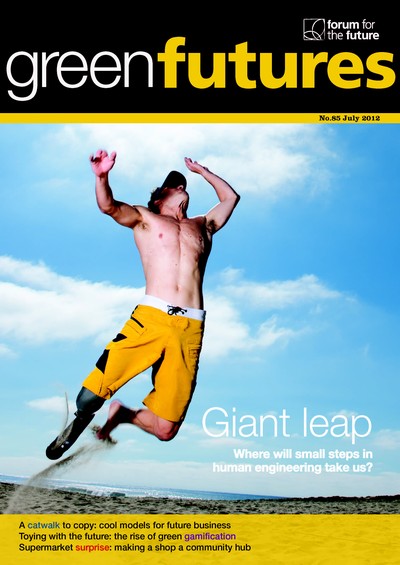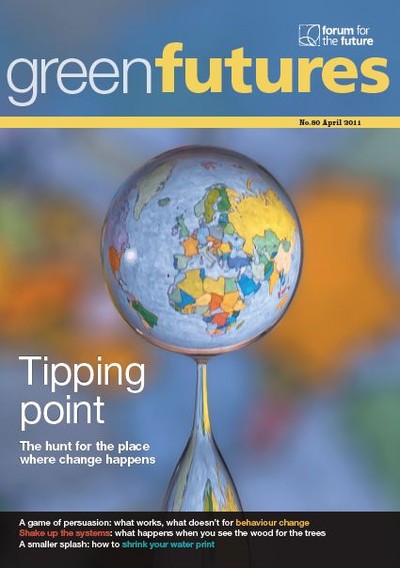Green Futures i — April 2011, #80

Green Futures
Green Futures is the leading magazine on environmental solutions and sustainable futures. Founded by Jonathon Porritt in 1996, it is published by Forum for the Future.
- 199 (51)
- United Kingdom
- Four issues a year
- First issue 1996
Remember the AIDS icebergs? Those public information films of the late 80s, which tried to terrify people into changing their sexual behaviour…
It’s a moot point how successful they were. The message was one of deep fear – images of icy waters and gothic gravestones. Have sex and you’re dead, it implied. Without actually telling you what you could do about it.
It was a classic case of what’s now known in behaviour change circles as ‘fear without agency’: scaring the hell out of people without giving them the means to take action.
We’ve come a long way since then. Or have we? In ‘The Persuaders’ [p26] we look at what works, and what doesn’t, when it comes to helping people behave in more sustainable ways.
When it comes to something as subtle as shifting deeply embedded habits and attitudes, the fear factor is spectacularly unsuccessful. It’s tempting to conclude that part of the reason for the rise in climate scepticism is the relentless ‘cry wolf’ tactics of environmentalists and governments alike. It’s all too easy, when the wolf doesn’t appear round the corner, to decide it was never really there. Cue mass denial.
The best kinds of behaviour change, it turns out – the ones that really stick – are those we do together, with our friends, neighbours, colleagues and peers. Which, in an age when we all worry about the atomisation of society, is rather heartening.
It’s one thing to change individual behaviour, of course; quite another to shift a whole system, such as food, energy or finance, towards sustainability. But that’s the challenge Forum for the Future has set itself with its new strategy, as unveiled in ‘The wood for the trees’ [p21].
It’s about finding the place where change happens. And, just as with behaviour, there’s growing awareness that it lies in the points where people and organisations come together: the links in the chain.
If there’s one system which is crying out for root-and-branch reform, it’s food. After years of enjoying ever cheaper food, without worrying too much about the social and environmental cost, we’re starting to see the consequences. Rising food prices helped trigger the revolutions of the ‘Arab Spring’: they might well unleash a lot more far-reaching upheavals in years to come.
In Tomorrow’s Food, Tomorrow’s Farms – the first of two special editions published with this issue – we look at what a truly sustainable food system might look like 20 years down the line, and how we might get there.
Forum’s aim to shift whole systems isn’t just driven by the fact that it’s the best way to achieve change. It’s also informed by a sense of urgency: a realisation that we simply don’t have the luxury of time to keep tinkering at the edges. That same sense has led some scientists to call for more drastic measures. And they don’t come more drastic than geoengineering.
Some view the idea of interfering in the very essentials of our atmosphere – whether by whitening clouds with seawater, or sending millions of aerosols into the sky to bounce back the sun – with horror: an act of potentially deadly hubris. Others think it could be our last, best hope of staving off catastrophic climate change.
What do you think of this issue?
Sign up or Log in to join the discussion.




